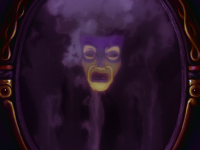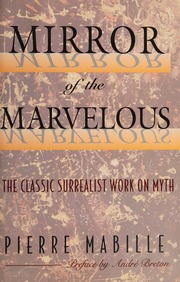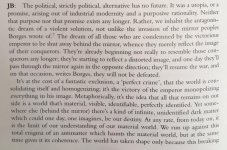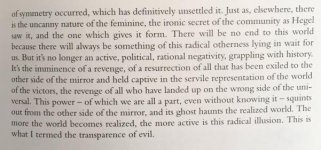You are using an out of date browser. It may not display this or other websites correctly.
You should upgrade or use an alternative browser.
You should upgrade or use an alternative browser.
The Mirror
version
Well-known member
It's such a potent device and object. Something capable of tearing people apart. Anyone who's ended up alone, looking into a bathroom mirror on psychedelics knows the magic of the mirror. It's an odd experience just staring into one for an extended period anyway, like looking at a word until you can no longer tell whether it's spelled correctly or even a word anymore.
version
Well-known member
The Fauna of Mirrors :: J. L. Borges
In one of the volumes of the Lettres édifiantes et curieuses that appeared in Paris during the first half of the eighteenth century, Father Fontecchio of the Society of Jesus planned a study of the superstitions and misinformation of the common people of Canton; in the preliminary outline he noted that the Fish was a shifting and shining creature that nobody had ever caught but that many said they had glimpsed in the depths of mirrors. Father Fontecchio died in 1736, and the work begun by his pen remained unfinished; some 150 years later Herbert Allen Giles took up the interrupted task. According to Giles, belief in the Fish is part of a larger myth that goes back to the legendary times of the Yellow Emperor.In those days the world of mirrors and the world of men were not, as they are now, cut off from each other. They were, besides, quite different; neither beings nor colours nor shapes were the same. Both kingdoms, the specular and the human, lived in harmony; you could come and go through mirrors. One night the mirror people invaded the earth. Their power was great, but at the end of bloody warfare the magic arts of the Yellow Emperor prevailed. He repulsed the invaders, imprisoned them in their mirrors, and forced on them the task of repeating, as though in a kind of dream, all the actions of men. He stripped them of their power and of their forms and reduced them to mere slavish reflections. Nonetheless, a day will come when the magic spell will be shaken off.
The first to awaken will be the Fish. Deep in the mirror we will perceive a very faint line and the colour of this line will be like no other colour. Later on, other shapes will begin to stir. Little by little they will differ from us; little by little they will not imitate us. They will break through the barriers of glass or metal and this time will not be defeated. Side by side with these mirror creatures, the creatures of water will join the battle.
In Yunnan, they do not speak of the Fish but of the Tiger of the Mirror. Others believe that in advance of the invasion we will hear from the depths of mirrors the clatter of weapons
Murphy
cat malogen

magical mirror; mirror-case | British Museum
Magic Mirror of Doctor Dee; obsidian; wood case covered in tooled leather with label in handwriting of Horace Walpole, quotation from a Samuel Butler poem.
version
Well-known member
i think in general something pretty major is going on in anglo society (at a minimum) with regards to people being aware of what they look like, and having a strong emotional relationship with their own perception of their own appearance. ubiquitous photography and video is quite a big deal i think and its something that is changing on a truly global level, to all of humanity
Yeah, absolutely. I think there's a good chance we'd collectively be much happier if we spent less time looking at ourselves.
It's strange to think there was a time when you'd only catch sight of yourself whilst looking into a body of water.
version
Well-known member
Something you see play out over and over is someone complaining about the content they see online and someone else responding that it's tailored to them. They're complaining about the results of their own tastes and browsing habits.
That may or may not be true, but it's received wisdom at this point and one of the default responses.
That may or may not be true, but it's received wisdom at this point and one of the default responses.
version
Well-known member

Yata no Kagami - Wikipedia
sus
Moderator
This thread never took off but gonna hyperlink it out in case there's anything good in there: https://www.dissensus.com/threads/17249/
sus
Moderator
Very fortuitous timing though I've been reading Moby Dick and listening to Dreyfus's lectures, and he talks a lot about sea vs land, water vs earth, so I've been meditating on this.
And one thing that struck me early on was that water was the source of the mirror-image in pre-modernity. Some places maybe had obsidian or ice (also a form of water) but by & large we're talking about ponds, streams, lakes
And one thing that struck me early on was that water was the source of the mirror-image in pre-modernity. Some places maybe had obsidian or ice (also a form of water) but by & large we're talking about ponds, streams, lakes
sus
Moderator
I got captured by a somewhat anxious mirror-relation one of my early acid excursions in college, and also came across tripping advice at that time along the lines of "don't look at the mirror." (Berghain, and some other imitator dance clubs, don't have any mirrors in their bathrooms, very intentionally)
So I began avoiding mirrors on trips. But I think you're right I should do some investigating. I'm a bit heartier now and less anxious, I won't freak out by ugliness of ancient zit scars or a small reddish rash or the horror of having pores
So I began avoiding mirrors on trips. But I think you're right I should do some investigating. I'm a bit heartier now and less anxious, I won't freak out by ugliness of ancient zit scars or a small reddish rash or the horror of having pores
sus
Moderator
Haven't seen the movie but it seems very archetypal from the Wiki plot summary. Like the barest mythological essence of COVID-19 lab leak & spread. Science delving into the deep and finding something horrible which once accessed can't be contained
sus
Moderator

Rochat, in contrast, models human cognition as fundamentally social in nature. Each person learns to be aware of himself – is constrained toward self-consciousness – by other people being aware of him. He learns to manage his image in the minds of others, and finds himself reflected, as in a mirror, through the interface of language and non-verbal communication.
sus
Moderator
Mirrors only became common in the nineteenth century; before, they were luxury items owned only by the rich. Access to mirrors is a novelty, and likely a harmful one... When people without access to mirrors (or clear water in which to view their reflections) are first exposed to them, their reaction tends to be very negative. Rochat quotes the anthropologist Edmund Carpenter’s description of showing mirrors to the Biamis of Papua New Guinea for the first time, a phenomenon Carpenter calls “the tribal terror of self-recognition”: "After a first frightening reaction, they became paralyzed, covering their mouths and hiding their heads – they stood transfixed looking at their own images, only their stomach muscles betraying great tension."
Why is their reaction negative, and not positive? It is that the first-person perspective of the self tends to be idealized compared to accurate, objective information; the more of this kind of information that becomes available (or unavoidable), the more each person will feel the shame and embarrassment from awareness of the irreconcilable gap between his first-person specialness and his third-person averageness.
There are many “mirrors”—novel sources of accurate information about the self—in our twenty-first century world. School is one such mirror; grades and test scores measure one’s intelligence and capacity for self-inhibition, but just as importantly, peers determine one’s “erotic ranking” in the social hierarchy, as the sociologist Randall Collins terms it. Of the school sexual scene “mirror,” he says:
…although the proportion of the population whose sex lives are highly active is small, this prestige hierarchy nevertheless has an effect on persons ranked throughout. Particularly among young persons living in public sexual negotiation scenes, there is a high level of attention paid to erotic stratification criteria, and acute awareness of who occupies what rank in the community’s ratings….
There are many more “mirrors” available to us today; photography in all its forms is a mirror, and internet social networks are mirrors. Our modern selves are very exposed to third-person, deflating information about the idealized self. At the same time, say Rochat, “Rich contemporary cultures promote individual development, the individual expression and management of self-presentation. They foster self-idealization.”
...One popular option is self-deception; normal, healthy people tend to have an unrealistically positive self image, to exaggerate or overestimate the control they have over their lives, and to be unreasonably optimistic. “Illusions, distortions, and self-deception appear to be integral to the way normal, well-adjusted people perceive the world,” says Baumeister (p. 224). “Seeing things as they really are is associated with depression and low self-esteem.” Where self-deception fails, there are other routes to escape the painful self. Elsewhere, Baumeister argues that behaviors such as alcoholism, binge eating, sexual masochism, charismatic religion, spirituality, and even suicide function as escapes from the overburdened, embarrassed, shameful modern self.






